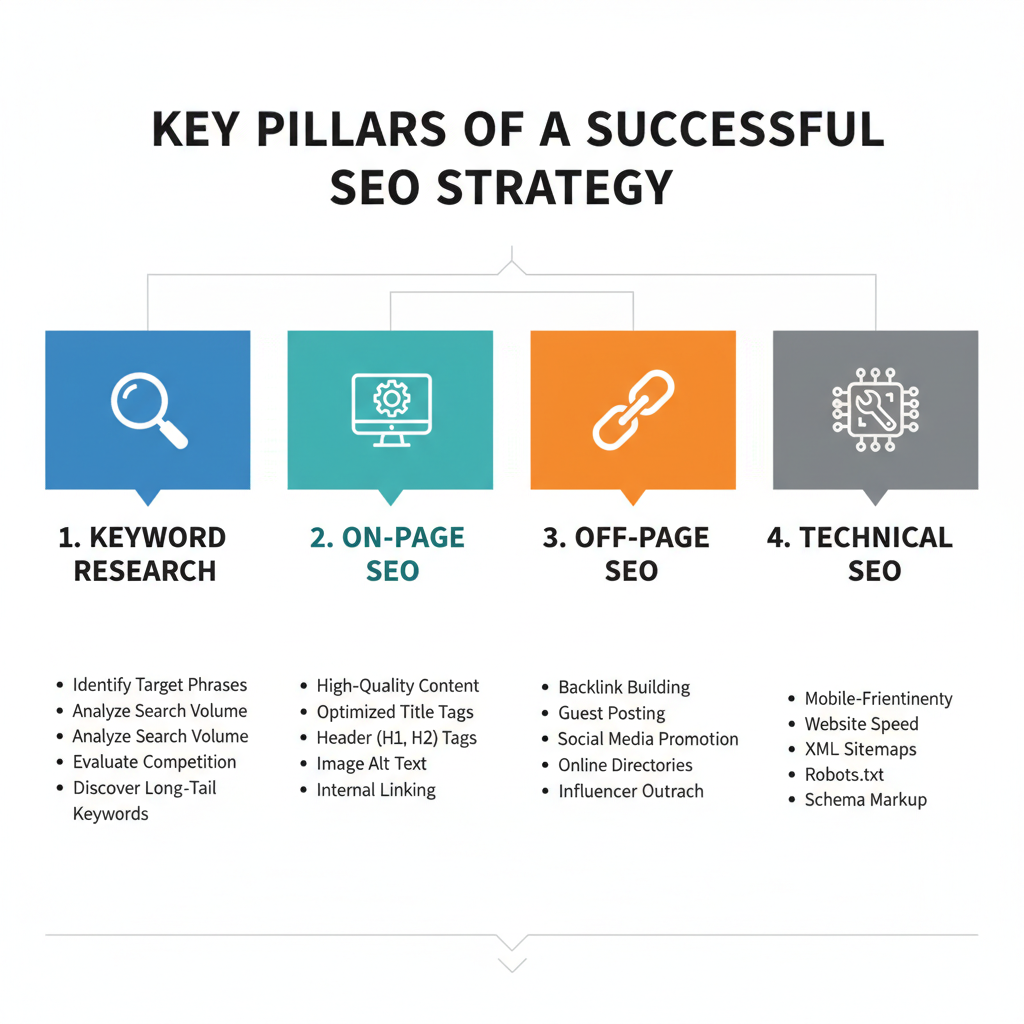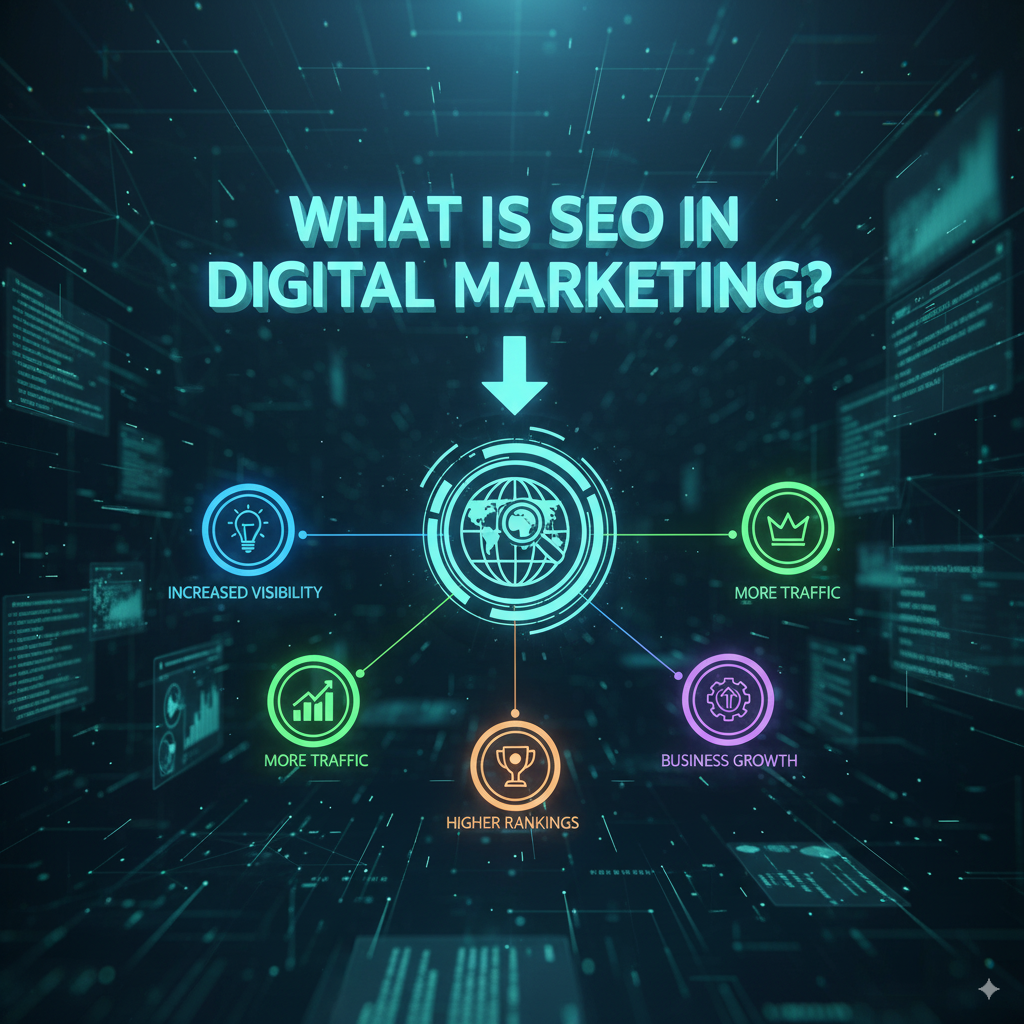- August 1, 2025
- by Mani SEO
- SEO
- 0 Comments
In the vast and ever-expanding digital landscape, simply having a website isn’t enough. To truly connect with your audience, attract new customers, and grow your business, you need to be visible. This is where Search Engine Optimization (SEO) comes into play. Far from a passing fad, SEO is a fundamental pillar of modern digital marketing, acting as the bridge between your online presence and potential customers actively searching for what you offer.
At its core, SEO is the practice of increasing the quantity and quality of traffic to your website through organic (non-paid) search engine results. Think of it this way: when you search for something on Google, you’re presented with a list of results. SEO is about making sure your website appears high up on that list, ideally on the first page, for relevant keywords and phrases.
Why is SEO So Crucially Important for Your Business?
The internet has become the primary source of information for billions worldwide. When people need a product, service, or answer to a question, their first instinct is often to “Google it.” If your business isn’t appearing in those search results, you’re essentially invisible to a massive segment of your target market.
Here’s a breakdown of why SEO is indispensable:
- Increased Organic Traffic: The higher your ranking, the more clicks you get. Organic traffic is highly valuable because these users are actively seeking information related to your business, making them more likely to convert into customers.
- Enhanced Credibility and Trust: Websites that rank high on search engines are generally perceived as more authoritative and trustworthy. Users tend to believe that Google recommends the best and most relevant sources.
- Cost-Effective Marketing: Unlike paid advertising (PPC), which stops delivering traffic the moment you stop paying, organic SEO provides long-term, sustainable results without direct ad spend. While it requires initial investment and ongoing effort, the return on investment (ROI) can be substantial.
- Better User Experience: A key component of SEO involves optimizing your website for user experience (UX). This means ensuring your site is fast, mobile-friendly, easy to navigate, and provides valuable content – all factors that Google considers in its rankings and that users appreciate.
- Competitive Advantage: In nearly every industry, your competitors are likely investing in SEO. If you’re not, you’re falling behind. A strong SEO strategy can give you a significant edge in attracting and retaining customers.
Key Pillars of a Successful SEO Strategy
SEO is a multifaceted discipline, encompassing various techniques and strategies. While the algorithms are constantly evolving, these core elements remain foundational:

1. Keyword Research
This is the starting point of any effective SEO campaign. Keyword research involves identifying the words and phrases your target audience uses when searching for products, services, or information related to your business. Tools like Google Keyword Planner, Ahrefs, and SEMrush can help you discover high-volume, relevant keywords with manageable competition.
2. On-Page SEO
On-page SEO refers to all the optimizations you make directly on your website pages to improve their search engine rankings. This includes:
- High-Quality Content: Creating valuable, informative, and engaging content that genuinely answers user queries and incorporates your target keywords naturally.
- Title Tags and Meta Descriptions: Crafting compelling title tags (the clickable headline in search results) and meta descriptions (the short summary below the title) that encourage clicks.
- Header Tags (H1, H2, H3, etc.): Structuring your content with clear headings to improve readability and signal content hierarchy to search engines.
- Image Optimization: Compressing images for faster loading times and using descriptive alt text for accessibility and SEO.
- Internal Linking: Creating logical links between relevant pages on your website to help users navigate and distribute “link equity.”
3. Off-Page SEO
Off-page SEO refers to activities done outside of your website to improve its search engine ranking. The most significant factor here is building high-quality backlinks.
- Backlinks (Link Building): When other reputable websites link to your content, it signals to search engines that your site is a valuable and authoritative source. Earning these “votes of confidence” through guest posting, content promotion, and outreach is crucial.
- Social Signals: While not a direct ranking factor, social media activity can drive traffic to your content, increasing its visibility and potential for earning backlinks.
- Local SEO: For businesses with a physical location, optimizing your Google My Business profile and ensuring consistent NAP (Name, Address, Phone) information across online directories is vital for appearing in local search results.
4. Technical SEO
Technical SEO ensures that search engine crawlers can efficiently access, crawl, and index your website. It’s about the backend structure of your site and includes:
- Website Speed: Optimizing your site to load quickly, as slow websites can frustrate users and lead to higher bounce rates.
- Mobile-Friendliness: Ensuring your website is fully responsive and provides an excellent experience on all devices, especially smartphones.
- XML Sitemaps: Providing search engines with a map of your website’s structure to help them discover all your important pages.
- Robots.txt: Directing search engine crawlers on which parts of your site they should or shouldn’t access.
- Schema Markup: Adding structured data to your website to help search engines better understand your content and display rich snippets in search results.
The Ever-Evolving Nature of SEO
SEO is not a one-time task; it’s an ongoing process. Search engine algorithms are constantly updated, and what works today might need refinement tomorrow. Staying informed about industry changes, regularly analyzing your performance, and adapting your strategy are key to long-term success.
In essence, SEO is about providing the best possible experience for both users and search engines. By focusing on creating valuable content, optimizing your website’s technical foundation, and building genuine authority, you can significantly improve your online visibility, attract more qualified traffic, and ultimately drive sustainable growth for your business in the digital age.
Conclusion: Partnering with an SEO Consultant for Digital Triumph
Navigating the complexities of Search Engine Optimization can feel like a daunting task, especially with algorithms constantly evolving and competition growing fiercer. This is precisely where the expertise of an SEO consultant becomes invaluable. More than just a service provider, an SEO consultant acts as your strategic partner, bringing specialized knowledge and a results-driven approach to your digital marketing efforts.
By leveraging their in-depth understanding of keyword research, on-page and off-page optimization, technical SEO audits, and continuous performance analysis, a skilled consultant can craft a bespoke strategy tailored to your unique business goals. They cut through the noise, identify the most impactful opportunities, and implement best practices that translate into higher rankings, increased organic traffic, and ultimately, a stronger bottom line.
In a landscape where online visibility dictates success, partnering with an SEO consultant isn’t just an expenditure; it’s a strategic investment in your business’s future. They empower you to outmaneuver competitors, connect more effectively with your target audience, and ensure your brand not only survives but thrives in the ever-expanding digital realm.



